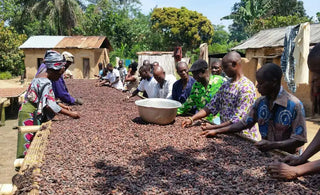A NEW ORIGIN: KPALIMÉ, TOGO
AN INTERVIEW WITH OSKAR & SAM, OF SWISS SUSTAINABLE TRADING COMPANY, GEBANA We “sat down” with Ron, Dandelion’s cocoa-sourcing manager, along with Oskar (Gebana’s Zurich-based head of cocoa sales) and...
AN INTERVIEW WITH OSKAR & SAM, OF SWISS SUSTAINABLE TRADING COMPANY, GEBANA We “sat down” with Ron, Dandelion’s cocoa-sourcing manager, along with Oskar (Gebana’s Zurich-based head of cocoa sales) and...

AN INTERVIEW WITH OSKAR & SAM, OF SWISS SUSTAINABLE TRADING COMPANY, GEBANA

We “sat down” with Ron, Dandelion’s cocoa-sourcing manager, along with Oskar (Gebana’s Zurich-based head of cocoa sales) and Sam (Gebana’s Lomé, Togo-based quality manager) to talk about what it’s like to sell beans to a company such as Dandelion. We’re the first U.S. bean-to-bar chocolate maker to source beans, via Gebana, from Togo (a small West African country between Ghana and Benin), and we look forward to an early 2024 release of our debut Kpalimé, Togo bar.
Oskar: Cocoa came to Togo with the French colonizers in 1916. It’s grown in the western part of the country, which is a small area compared to neighboring Ghana or Ivory Coast. Gebana has been developing our network in the country for more than ten years. Right now, we work with about 2,000 farmers split into five cooperatives. Half are organic, and we’re working towards everyone becoming organic in the near future.
Sam: Also, we are working to improve the quality and other aspects. Most producers farm on small plots, and ferment and dry the beans themselves in heaps covered with banana leaves.
Oskar: We met in October 2022 and sent samples, which took a few weeks to arrive. Then Dandelion analyzed the samples for several weeks before ordering beans in February 2023. We shipped the beans via container from the port of Lomé to Oakland in August 2023, so they’ll arrive this month!
Ron: This was a quick turnaround for us. A new producer relationship can take up to two to three years before we purchase beans. We like to spend time getting to know each other. These beans are delicious — they’re very rich and chocolatey. We’re also excited to feature this production model, where individual farmers are growing, harvesting, fermenting, and drying their own cocoa.
Oskar: A typical farm size is half a hectare. Each produces an average of 250 kilos, which is a rather low productivity. It’s a challenge to make a living with a farm that size. They do grow other crops like coffee and plantains for local markets, but the additional cash from export crops like cocoa is important, as it enables individual investment choices (e.g., allowing children to continue with education, treating relatives in the hospital, or simply improving the house).
Oskar: Our biggest challenge is getting farmers to move away from non-organic pesticides. For them, there is no difference — both come as a white powder you dissolve in water. There’s also local skepticism around organic certification, especially due to the certification costs. Most farms are more or less organic anyway, but we have to make sure they don’t use non-organic pesticides, when it’s necessary to treat their crops against a pest. Gebana pays for organic certification for every farm.
Oskar: Climate change is causing unpredictable yields. For example, this year we thought we would have 20 metric tons of cocoa to sell to Dandelion, but the yield was short because of lack of rain. Rain patterns have changed, and as a result crops are less productive and predictable. In the end we only had 5 metric tons available to ship to Dandelion.
Sam: Dandelion’s requirements are a welcome challenge for us. The sorting out of dark beans, for example, which are not bad from a traditional quality point of view, led us to renew efforts to improve our fermentation processes. In the end, better practices lead to less loss and thus higher incomes for the farmers, which is one of our main goals. We see Dandelion’s requirements as an opportunity to improve.
Oskar: We share the same values: making an authentic product, building long-term relationships around it, and having a positive impact on the farmer communities we rely on. Having Dandelion work with us to find solutions to the many challenges we encounter in our work is really valuable.
We’re especially happy that Dandelion contributes generously to our Gebana Model. In this model, we share our B2C turnover with the farmers and invite B2B customers like Dandelion to pay a higher price for the cocoa. The Gebana Model Premium is then paid out to all our farmers at the end of the season. Dandelion pays one of the highest Gebana Model markups of all our B2B clients.
Ron: We like to work with producers we like, who like us, and who share our values. Working with Gebana and the team in Togo has been very transparent and collaborative. It’s the only origin we work with where the individual farmers do all the growing, harvesting, fermenting, and drying themselves. It’s exciting to work with this production method, and it offers us an opportunity to educate both ourselves and our guests on all models of cocoa production.
Oskar: Zotter, and a few smaller makers across Europe. Now we only work with Dandelion in the U.S. We also have a few bigger clients that have more traditional large-scale processing (and products).
Oskar: For Gebana to make chocolate in Togo. We’ve invested in a small processing line, and we have one person working on it part-time. We want to sell across Europe eventually, likely in Switzerland to begin with.
Thank you, Oskar and Sam. We look forward to releasing this bar in early 2024, and in the meantime, check out our current selection of origins.
Your cart is currently empty.
Start Shopping